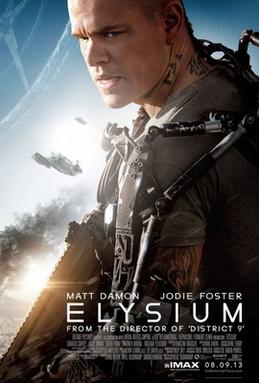Elysium (2013)
After his last film, the jaw-dropping District 9, I had high hopes for South African filmmaker Neill Blomkamp's latest sci-fi action movie, Elysium. A story about class warfare in the future, Elysium packs a far higher budget than the comparatively small-scale District 9 (though at $115 million, it's still chump change compared to the insane figures being thrown around by many modern blockbusters), affording it an A-list cast and a much greater playground for Blomkamp to run wild in... but also the potential for him to rely too much on CGI action set pieces, using them as a crutch and an excuse to skimp on the storytelling that elevated District 9 from a cool little action movie to one of the greatest science fiction films of the 21st century. The result, fortunately, stays well clear of that worst-case scenario, producing a film that's not up to District 9's standard, but still stands out in a summer that has otherwise been dominated by a deafening drumbeat of destruction.
Elysium takes place in the year 2154, where humanity's upper classes, looking to escape from Earth's increasingly degraded environment, have fled to the titular space colony, a massive ring orbiting their former homeworld, which they left to a swelling population of impoverished dregs fighting over the scraps left behind. One of those dregs is Max DeCosta (Matt Damon), a factory worker and former career criminal in the favelas of Los Angeles who, through an accident at work and his criminal buddies attempting to get immigrants to Elysium, gets caught up in a conspiracy involving the leaders of the elite colony's society and political system, particularly Secretary of Defense Delacourt (Jodie Foster), who is plotting a coup. While some of the finer details of how this society is set up don't quite make sense (for example, surely they could afford to send at least one of those magical medical pods to at least one hospital on Earth?), I otherwise bought into the bigger picture of the dystopian future that Blomkamp has created here. Mexican slums are used to stand in for future LA, and the effect (combined with a largely Latino supporting cast for the Earth-based scenes) was simultaneously breathtaking, ominous, and angrily prophetic in its bleakness, even if it was at times more than a bit reminiscent of District 9. The space colony, meanwhile, was just as gorgeous, its design (in both its shape and its lush environment) instantly recognizable to anybody who's played Halo, serving as a stark contrast to what its inhabitants escaped from.
That's not to say that this film is just cool visuals, though. The film's political metaphors about inequality, immigration, and health care can, at times, feel too on-the-nose for their own good, but in most cases, this film weaves them into an intricate plot where not a single character feels out-of-place or superfluous. When one character acts, everybody around him or her reacts in a manner that makes sense given their personalities and the circumstances, and everybody has an ultimate goal in front of them. It helps that Blomkamp found talented actors to take these well-written characters and give them life. Matt Damon has done this sort of tough role before in the Bourne films, so it only makes sense that he'd be stellar as Max, and naturally, he is. Jodie Foster brings a touch of wicked class (and gets to show off her French language skills) as Delacourt, the hard-headed military leader with ideas of her own for how Elysium should be run. Alice Braga takes one of the smaller roles, as Max's childhood friend turned nurse Frey, and makes us believe in her as a desperate mother willing to make great sacrifices to save her daughter from illness. The real standout, however, must be Sharlto Copley as Delacourt's black-ops agent Kruger. Reuniting with Blomkamp after District 9, Copley's Kruger is a world apart from that film's scared bureaucrat Wikus. Here, Copley is flat-out monstrous, the sort of man that I would never want to be in the same building with, let alone the same room. He engages in brutal violence with a gigantic "fuck you" smile on his face, and the fact that he was able to play Kruger as well as he played Wikus is a testament to his skill and range as an actor.
If the film has one truly glaring flaw, it is in the action scenes. Blomkamp is incredibly skilled at world-building and drama, but his hand shooting this film's action leaves much to be desired, with the camera rocking around like a boat in a storm, rapidly cutting, and making it difficult to follow the events on screen. Given how gorgeous the CGI effects are (and how brutal the gore is -- word of warning, this is a very R-rated film) in the moments where we get a nice, long look at it, it's a shame that the action doesn't quite measure up to the rest of the film's shining moments. Furthermore, by the end it sometimes feels as though this film is moving along a bit too quickly, with some moments leaving me scratching my head because I wasn't keeping up, though the fact that I had to take two bathroom breaks probably had something to do with that (damn lemonade). Taken together, these two issues produce a film that feels like it should've slowed down a bit for the action scenes to be more coherent, for some of the milder quibbles I had with the plot to be filled, and to just allow the film some room to breathe.
Score: 4 out of 5
It's not the next District 9, but that film was a very tough act to follow no matter how you slice it. This is a solid sophomore effort for Neill Blomkamp, a sci-fi action movie that is both thought-provoking and badass.

No comments:
Post a Comment